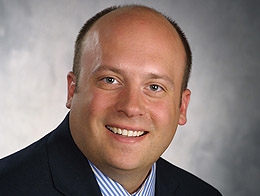
Baraboo RTT graduate Jamie Kling, DO, says the relationships with patients—in and out of the clinic—are the most rewarding part of being a rural physician.
For Baraboo family physician Jamie Kling, DO, many patients are friends—and many friends are patients.
Every week, the 2006 graduate of the UW Department of Family Medicine’s (DFM) Baraboo Rural Training Track (RTT) runs into patients—and meets new ones—in grocery stores, restaurants, the bowling alley.
That’s the life of a rural physician. And for Dr. Kling, that’s the best part about it.
‘You Have to Go to Baraboo’
Dr. Kling didn’t originally set out to be a physician. As an undergraduate, he planned on becoming a biology teacher. But several unrewarding student teaching experiences later, he decided to pursue medicine instead.
“My advisor suggested medicine, because you have a captive audience, you educate them about their health, and they are interested because it’s about them,” he recalled.
Dr. Kling went on to complete a doctor of osteopathy at Des Moines University’s Osteopathic Medical Center. In his third year, while completing a clinical experience in Cleveland, he met classmate Philip Arnold, DO, who is also a DFM residency graduate.
“I didn’t like big-city family medicine, and Phil said, ‘You have to go to Baraboo and train with
“I came here as a fourth-year student, rotated at the clinic for a month, and knew this was what I wanted. It was the only program I ranked for my match.”
The Rural Residency Difference
The Baraboo RTT appealed to Dr. Kling because it functions like a true apprenticeship. “You’re treated like a colleague right away, you have your own patients, and everything around you is just support,” he said.
That’s an appropriate way to train rural family physicians, who must quickly become comfortable performing a wide range of procedures to meet the health care needs of the community they serve.
For example, Dr. Kling estimates that he delivered hundreds of babies in his intern year alone. “One of the most important things you learn in rural practice is how to triage and get people where they need to be,” he said.
Friendship and Trust Are the Rewards of Medicine
Since 2006, Dr. Kling has practiced full-spectrum family medicine at Dean Clinic in Baraboo: delivering babies, caring for children and adults, and visiting elderly patients in skilled nursing facilities.
In fact, now that Dr. Damos has retired, many of his patients are becoming Dr. Kling’s patients. “I always say that I have big shoes to fill,” Dr. Kling laughed.
Dr. Kling also performs osteopathic manipulative treatment (OMT), teaches OMT skills to residents in the clinic, and participates in the DFM’s statewide osteopathic residency program workshops.
But the connections with patients and the community are the best parts of the job.
“Patients look at me as the number-one person for their care,” he explained. “They ask for my opinion before they go to an appointment with a specialist. They want to pick my brain about what I know, and have me help them use the Internet to answer their questions.”
And often, those patients become friends—friends who, for example, see him at the bowling alley and mention that their father needs a new doctor.
“To have a friendship with someone, to be able to take care of them and know that they trust me to see their family—that’s the rewarding part of medicine,” he said. “I’m part of the community, not just working in the community.”
Published: January 2014
